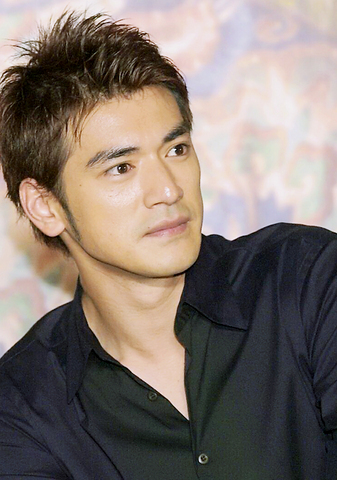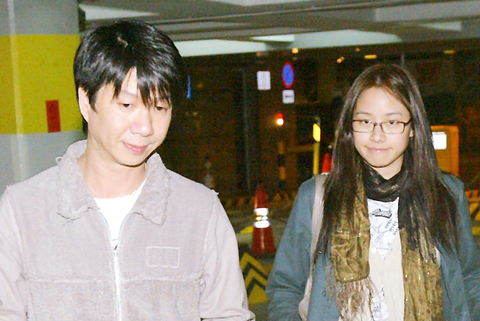The annual musical pilgrimage to Spring Scream has come to an end and Kenting is once again restored to its tropical quiet. But on a peaceful, breezy early Monday morning on the beach, singer Shino Lin (林曉培), a guest musician at the festival, was spotted lying on top of a rugged young man in after-party languor, near a group of dozens of people enjoying a beautiful sunrise and camp fire. As the sun got higher and warmer, the seemingly wasted singer finally got up but could barely walk without her friends coming to her aid.
Later that day, Shino
confirmed to the Apple Daily (

PHOTO: TAIPEI TIMES
Another couple wasn't so lucky to get away from the watchful eyes of the media so easily. The questionable extramarital affair between the former TVBS sportscaster Cheng Sheng-hung (陳勝鴻) and TVBS-N news channel anchorwoman Pan Yen-fei (潘彥妃) has dominated the gossip pages for two consecutive weeks now. It's impossible to get away from the media hype even if you try.
Accused by one of his many ex-girlfriends -- a woman identified as Miss Lin -- that he videotapes his sexual encounters without his partner's consent, Cheng has changed his testimony back and forth, saying once that Pan was fully aware when the intimate pictures of them kissing and cuddling were taken, but saying something totally different later.
Most of the main characters in this show have been telling their self-contradictory, fabricated stories while following their instincts for self-preservation. But Pan is refusing to play the leading lady in the soap opera any more. The married anchorwoman quit her job right after the affair was exposed and intimate photos took up the front pages of every local newspaper. She left a confessional note to the public last Friday, saying in a tortured, heart-broken tone, ``I've left Taiwan and won't be back for a long long time. I will vanish in silence.''

PHOTO: TAIPEI TIMES
Not every love story is X-rated and promiscuous. Hong Kong's sweetheart Lin Jia-xin (林嘉欣) blew a refreshing breeze into the gossip scene when she was spotted going to a musical with her musician boyfriend, Chen Guang-rong (陳光容). Wearing jeans, sneakers and black-framed glasses, the star looked even prettier without traces of make-up. Rumor has it that Lin's agent got really pissed at her high-profile romance and decided to ``freeze'' her. The smiling young actress denied the freeze talks, saying she is just taking a break from her busy schedule and has been having a great time with her honey.
It was recently reported that Takeshi Kaneshiro (金城武) has an evil brother living on the dark side, who owes the Taiwanese mafia a huge debt and has been on the lam for a while now. The star is following the code of secrecy, or "omerta," about the affair and at a recent beauty-product endorsement press conference in Shanghai on Tuesday, the organizer got really nervous about a possible confrontation between the media and the star, deciding to limit reporters to five questions each. One local media member, however, broke the rules and popped the forbidden question. The princely star said nothing and gave a charming smile instead. Magically, everybody seemed melted by his angelic beauty and forgot he was just masterfully dodging the unwelcome subject.

The unexpected collapse of the recall campaigns is being viewed through many lenses, most of them skewed and self-absorbed. The international media unsurprisingly focuses on what they perceive as the message that Taiwanese voters were sending in the failure of the mass recall, especially to China, the US and to friendly Western nations. This made some sense prior to early last month. One of the main arguments used by recall campaigners for recalling Chinese Nationalist Party (KMT) lawmakers was that they were too pro-China, and by extension not to be trusted with defending the nation. Also by extension, that argument could be

Aug. 4 to Aug. 10 When Coca-Cola finally pushed its way into Taiwan’s market in 1968, it allegedly vowed to wipe out its major domestic rival Hey Song within five years. But Hey Song, which began as a manual operation in a family cow shed in 1925, had proven its resilience, surviving numerous setbacks — including the loss of autonomy and nearly all its assets due to the Japanese colonial government’s wartime economic policy. By the 1960s, Hey Song had risen to the top of Taiwan’s beverage industry. This success was driven not only by president Chang Wen-chi’s

Last week, on the heels of the recall election that turned out so badly for Taiwan, came the news that US President Donald Trump had blocked the transit of President William Lai (賴清德) through the US on his way to Latin America. A few days later the international media reported that in June a scheduled visit by Minister of National Defense Wellington Koo (顧立雄) for high level meetings was canceled by the US after China’s President Xi Jinping (習近平) asked Trump to curb US engagement with Taiwan during a June phone call. The cancellation of Lai’s transit was a gaudy

The centuries-old fiery Chinese spirit baijiu (白酒), long associated with business dinners, is being reshaped to appeal to younger generations as its makers adapt to changing times. Mostly distilled from sorghum, the clear but pungent liquor contains as much as 60 percent alcohol. It’s the usual choice for toasts of gan bei (乾杯), the Chinese expression for bottoms up, and raucous drinking games. “If you like to drink spirits and you’ve never had baijiu, it’s kind of like eating noodles but you’ve never had spaghetti,” said Jim Boyce, a Canadian writer and wine expert who founded World Baijiu Day a decade